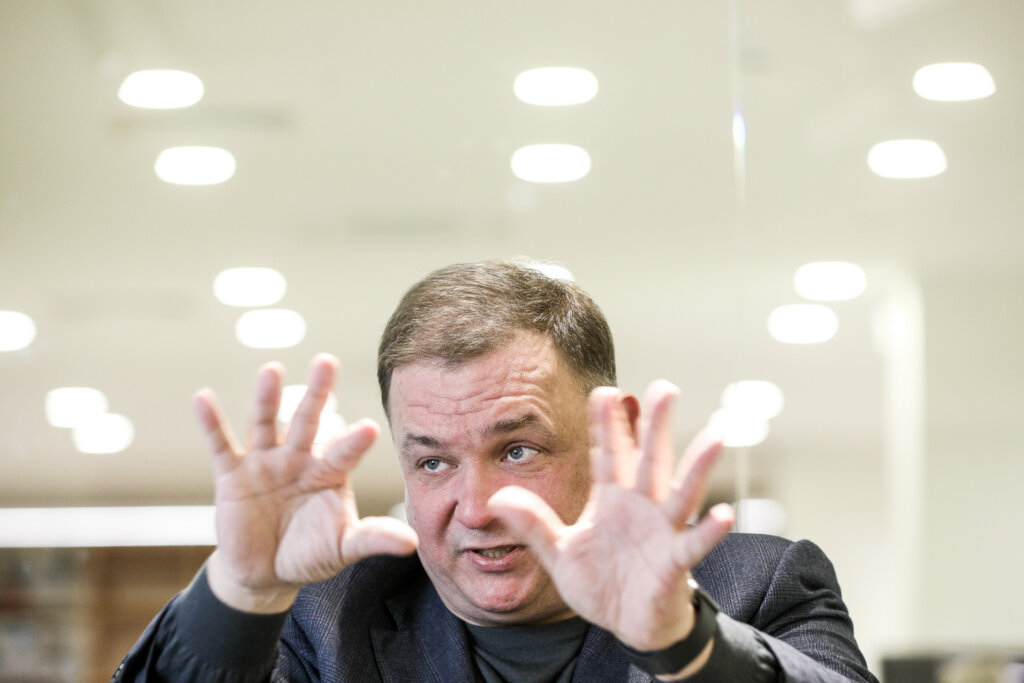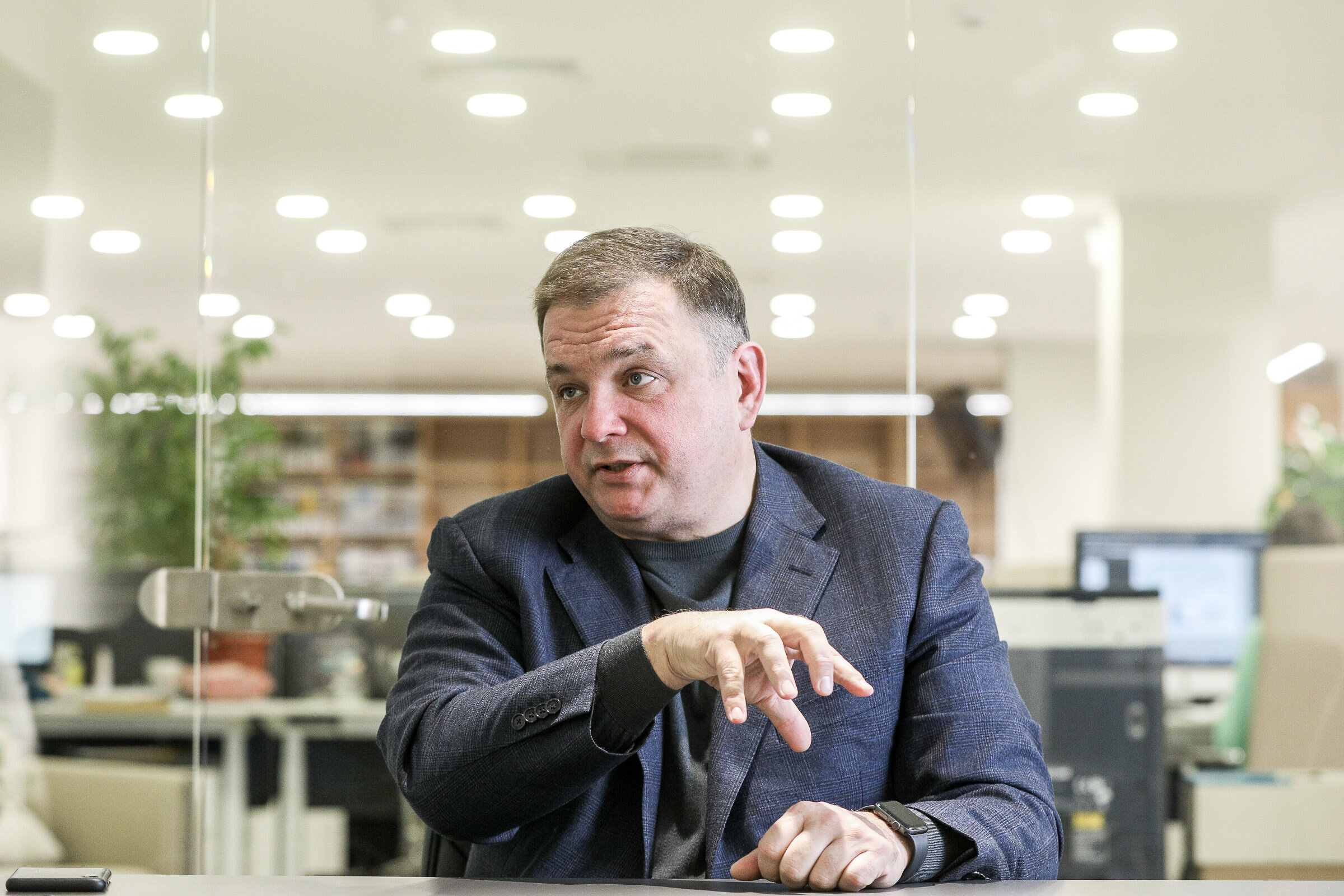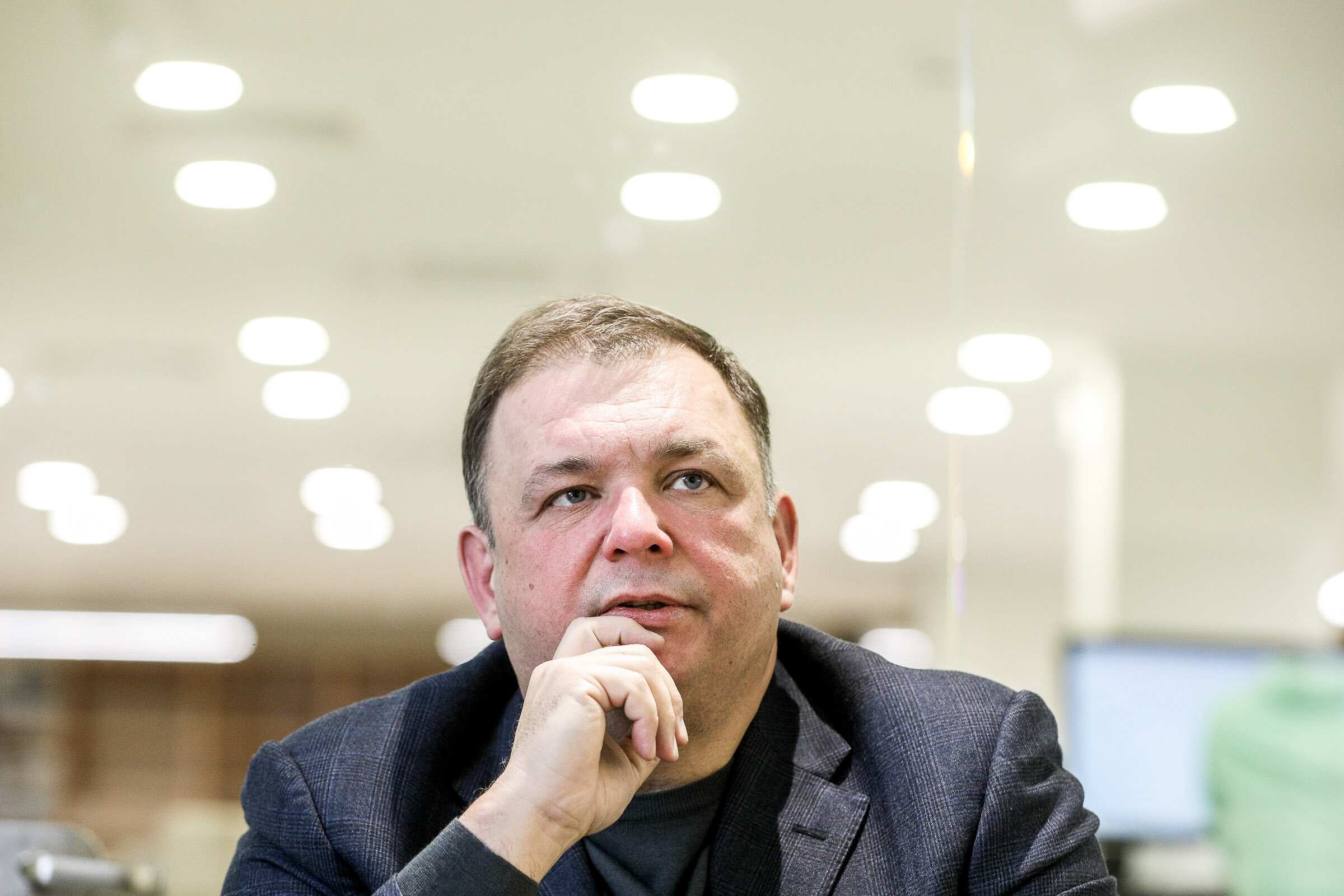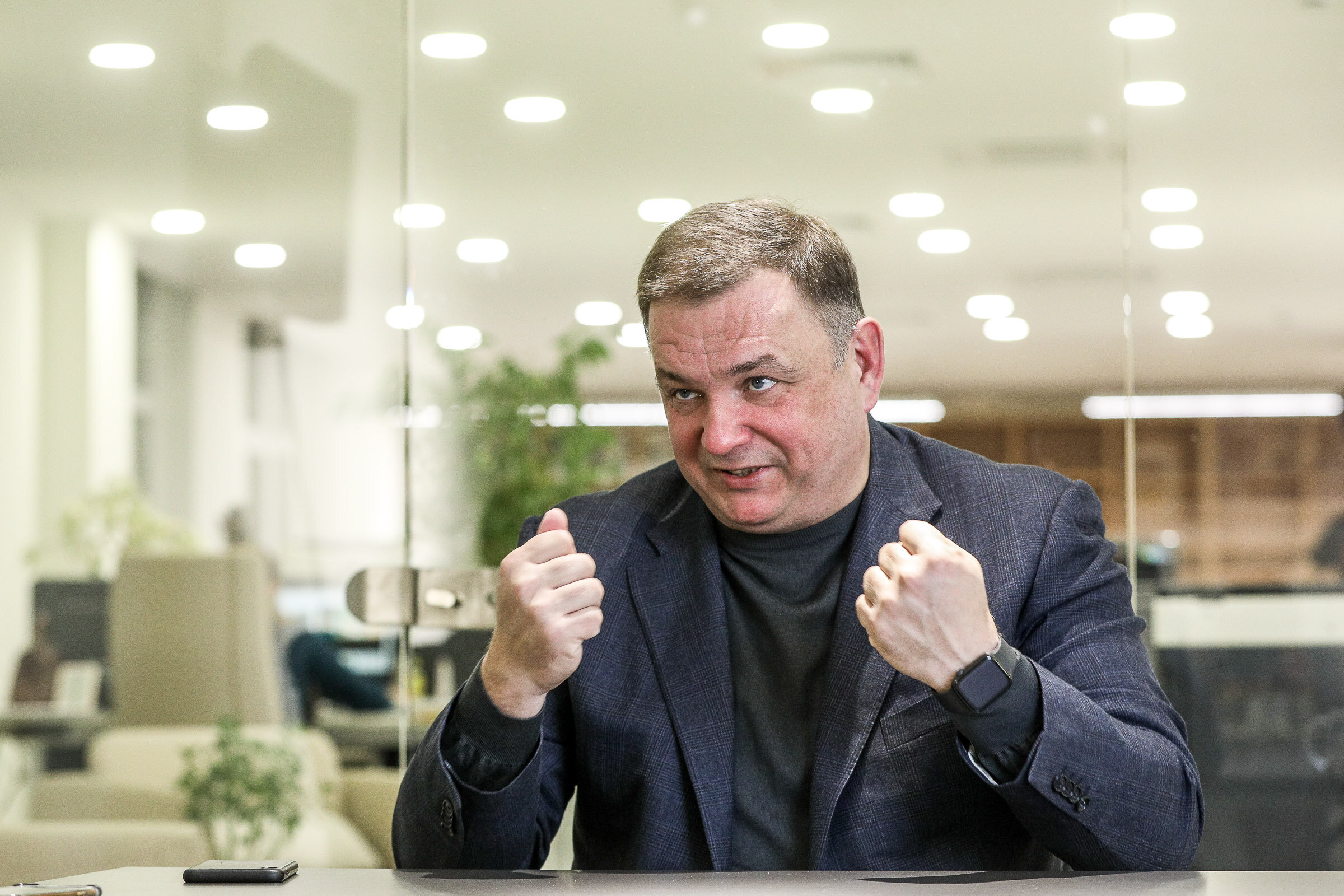Ukraine’s constitutional crisis has reached an unnerving stalemate.
Three weeks have passed since the Constitutional Court dealt a deadly blow to anti-corruption infrastructure and President Volodymyr Zelensky threatened to disband it through parliament.
But what started as a rapidly snowballing crisis has suddenly stalled. Zelensky doesn’t have the votes to disband the court. The court doesn’t have the quorum to proceed with its detrimental agenda.
Meanwhile, the future of Ukraine is at stake. The country stands on the brink of losing the support of the European Union and the International Monetary Fund, plus a whole lot more, due to the court’s past — and possibly future — rulings.
And this is exactly what the judges want, according to Stanislav Shevchuk, a former chairman of the Constitutional Court.
“It is a planned attack that aims to undermine the state of Ukraine and divert it from the pro-Western course,” Shevchuk told the Kyiv Post in an interview on Nov. 18. “It’s for sure coordinated by forces outside the court. The Kremlin has to have a hand in it.”

Stanislav Shevchuk, former chairman of the Constitutional Court, speaks with the Kyiv Post on Nov. 18, 2020, in the newspaper’s headquarters in Kyiv. (Kostyantyn Chernichkin)
Shevchuk has had a front-row seat in the boiling calamity at the court.
His firing as chairman in 2019 laid the groundwork for today’s crisis. It allowed the court to fall into the hands of Oleksandr Tupytsky, a controversial judge who now leads the court’s assault on the anti-corruption infrastructure.
Shevchuk’s story offers an unparalleled — and chilling — insight into the shady dealings of the most powerful court in Ukraine.
Well-planned attack
The ongoing crisis began after the Constitutional Court judges conducted a swift attack on Ukraine’s anti-corruption institutions in October. With several rulings, they undermined two key agencies: the National Anti-Corruption Bureau (NABU), by ruling the appointment of its chief Artem Sytnyk as unconstitutional, and the National Agency for Corruption Prevention (NAPC), gutting its power to enforce a law against illegal enrichment by public officials required to declare their income and assets.
Next on the court’s agenda are even more detrimental rulings that could kill the High Anti-Corruption Court, the creation of an agricultural land market, protection of the Ukrainian language and the soundness of Ukraine’s banking system.
Shevchuk said the reversals are no accident.
“It’s a complex of measures that aims to undermine Ukraine’s anti-corruption institutions,” he told the Kyiv Post. “The goal is to kill Ukraine’s Euro-Atlantic vector.”
While Russia “definitely plays a part in it,” Shevchuk says that there are forces in Ukraine that are also interested in killing Ukraine’s cooperation with the West.
“Tupytsky wouldn’t be so bold if he didn’t get some sort of guarantees from someone powerful that he’ll be safe,” says Shevchuk.
Russian trace
Russia’s footprints in the constitutional crisis are obvious.
The main defender of the court’s actions is the pro-Russian Opposition Platform — For Life party that has 44 seats of the 424 seats in parliament. The party’s lawmakers are the main plaintiffs to the court: It was their complaints that served as starting points for the court’s rulings against the anti-corruption institutions.
The party unleashed its powerful propaganda weapon of three TV channels owned by one of its top members — 112, NewsOne and ZIK — to defend the Constitutional Court’s actions and call out protesters against the decisions for “trying to pressure the court.”
That messaging is in sync with the court’s chairman Tupytsky, who calls any accusations against him and the court “political pressure.”
Shevchuk recalls that back in 2018, when he was chair of the court, Tupytsky wanted to speed up the court’s hearing on the constitutionality of the sanctions that parliament introduced against channels 112 and NewsOne over their being a threat to national security. The court had the power to lift the sanctions. In the end, there was no hearing.
The Opposition Platform’s headquarters didn’t respond to questions about whether its members were among the orchestrators of the court’s rulings and the crisis that followed.
Crisis benefactors
There are plenty of benefactors of the Constitutional Court’s actions inside Ukraine, too.
Already over 100 corruption cases were closed and two convictions were canceled as a result of the October rulings that undercut the anti-graft infrastructure.
That benefits a wide range of characters: shady lawmakers accused of bribery; officials like Odesa Mayor Hennady Trukhanov, who saw two cases against him closed; and several judges of the Constitutional Court, who themselves were investigated on corruption suspicions — and voted to kill anti-corruption legislation despite the clear conflict of interest.
The upcoming rulings on the court agenda can benefit former owners of insolvent banks, and cost Ukraine billions.
The court is preparing to rule on the constitutionality of the Deposit Guarantee Fund. Killing the fund will give dozens of ex-owners of insolvent and nationalized banks a pretext to sue for compensation. The biggest benefactors of this will be oligarchs Ihor Kolomoisky and Hennady Boholyubov, former owners of PrivatBank, whose bankruptcy cost taxpayers $5.6 billion.
This hearing “is a high priority for the judges,” says Shevchuk. “The (killing of) online asset declarations and the banking system was meant to call into question Ukraine’s standing as a trusted partner with Western partners.”
Read More: Constitutional Court judges live far beyond their stated means
Why are the judges doing it? Some judges are paid for certain rulings, Shevchuk says, although some may be voting out of their true beliefs.
Furthermore, the judges are defending themselves. Shevchuk believes that the rulings on anti-corruption institutions came at least partly as a response to investigations by the NABU and NAPC against judges of the court.
“They needed to have some political cover,” Shevchuk says.
By shaking things up, they got a bargaining chip with the government.
First blow
The groundwork for the crisis was laid in early 2019.
In February 2019, the Constitutional Court made a scandalous ruling — it killed the law on illicit enrichment, irreversibly wiping away years of investigations and allowing officials to escape punishment. It caused an uproar in Ukrainian society.
Back then, the court was chaired by Shevchuk. He supported the ruling, and publicly defended it.
Today, he says that he made a mistake.
While he still thinks that he was right from the legal standpoint — the illicit enrichment law was unconstitutional and couldn’t stand — he says he was wrong to even put such a political issue on the agenda.
“I was defrauded,” he says.
Shevchuk believes that, behind his back, certain judges of the court were bribed to support the ruling.
He calls such hearings “commercial” cases. For a number of the court’s judges, “commercial cases,” or bribery, are the main reason to be on the court, according to Shevchuk.
Had he realized that the illicit enrichment ruling was passed through bribery, he would have resigned then and there, he says now.
Shevchuk says he is sorry that it happened under his watch.
“It’s my personal tragedy. It will haunt me for a long time,” Shevchuk says.
How it all started
Months after the scandal, Shevchuk was fired from the court by a vote of the judges. He became the first-ever judge of the Constitutional Court to be fired.
Shevchuk says the firing was illegal. He says it was a “coup” organized by Tupytsky and the forces outside the court.
It was the culmination of tensions in the court that had been present for years.
According to Shevchuk, as of 2018, the court was paralyzed.
Two factions inside the court were at odds: a group of six judges appointed during the rule of former President Viktor Yanukovych and a group of four judges appointed after the EuroMaidan Revolution that ousted him. The first group was led by Tupytsky, the second by Shevchuk.
“The two groups were blocking each other’s work,” says Shevchuk. “It was a very unhealthy situation.”
In a Constitutional Court consisting of a maximum of 18 judges, where 10 votes decide the outcome of a ruling, working together was key.
The election of Shevchuk as chairman and Tupytsky as his deputy was supposed to end the tensions.
“To unblock the work of the court, I had to make Tupytsky my deputy. I didn’t want to, but I had to,” says Shevchuk.
In May 2019, Tupytsky rallied 12 of 18 judges to vote Shevchuk out.
“Tupytsky ousted me because I wasn’t going to pass rulings on a ‘commercial’ basis,” Shevchuk says. “They needed an obedient chairman.”
Shevchuk was fired on May 14, six days before Zelensky took office. He says that such a decision couldn’t be made without being sanctioned by the highest echelons of power.
The NABU is now investigating a suspected conspiracy that led to Shevchuk’s firing.
According to the investigation, parts of which were leaked to the press, Pavlo Vovk, a notorious and powerful judge leading the Kyiv District Administrative Court, appeared to be coordinating Shevchuk’s ouster.
On covert recordings made in his office, Vovk is heard saying that “we own the Constitutional Court now.”
Shevchuk believes he wasn’t bluffing.
Vovk has long denied all these accusations and been ignoring NABU’s summonses for questioning.
The question remains as to who was in on the alleged conspiracy with Vovk and Tupytsky.
Journalist Yuriy Butusov, chief editor at Censor.net, reported that the NABU has a tape on which Vovk discusses Tupytsky’s appointment as chair of the court with Andriy Bohdan, then-head of the Zelensky administration, and Andriy Portnov, an ex-official who was in charge of the court system in President Viktor Yanukovych’s administration.
Read More: Sources: Judicial conspiracy laid groundwork for Constitutional Court’s rebellion
Other tapes that were leaked verify that Vovk was in touch with Bohdan. Bohdan did not respond to a request for comment.
Shevchuk says that he knows from his sources that the judges didn’t even write the ruling that ousted him.
“The ruling was drafted outside the court and given to the judges,” says Shevchuk.
Shevchuk believes that the same was true for the scandalous ruling that killed asset declarations in October.
Shevchuk fights back
Shevchuk challenged his firing and won — but only on paper.
He believes that his reinstatement can be a legal way out of the ongoing crisis because he would replace Tupytsky, who leads the court now.
The problem is that the Constitutional Court doesn’t want him back.
In October 2019, a court ordered Shevchuk’s reinstatement. The Constitutional Court failed to abide by the ruling, referring to an article of the Constitution, which states that the court’s decision is final and cannot be undone.
“It’s absurd,” says Shevchuk, adding that it means that judges can be blackmailed by threatening them with firing.
Shevchuk says he’s not even allowed to enter the building of the court — even to visit the court’s library, which is open to all former judges.
“I was told that the guards were instructed to not let me in,” he says.
Ways out of crisis
The perfect way out of the constitutional crisis, according to Shevchuk, would be for Tupytsky to resign. However, he indicated he wasn’t going to do it.
An imperfect but radical solution would be to pass Zelensky’s suggested law to fire all judges of the court.
Shevchuk says this move is partially justified, because “the Constitutional Court went against the Constitution,” but he thinks it’s going too far.
“I don’t think that all of the judges need to go,” he said. “Those several who didn’t vote for the scandalous rulings should stay.”
There are currently not enough votes in parliament for Zelensky’s proposal. Parliament Speaker Dmytro Razumkov offered an alternative bill. It would restore the powers of the NAPC that were taken away by the Constitutional Court.
Yet, it won’t reform the court, leaving the country exposed to future threats.
“Razumkov’s bill is a way to save Tupytsky. I don’t know if Razumkov is doing it deliberately,” says Shevchuk.
Razumkov’s spokesperson said that he can’t comment because he is currently sick with COVID‑19.
There is one more way to solve the crisis. If Tupytsky, the chair of the court, were charged with a crime, Zelensky could suspend him.
There are currently three investigations into Tupytsky. According to Kyiv Post sources familiar with the matter, in one case — the conspiracy to fire Shevchuk — the charges have been drafted and given to Prosecutor General Iryna Venediktova to be signed.
Venediktova’s office told the Kyiv Post that, officially, they haven’t received the charges against Tupytsky.
Prosecuting Tupytsky may not prove easy. A source familiar with the matter told the Kyiv Post that Tupytsky is enjoying help from prominent lawyer Viktor Barsuk, senior partner at the Equity law firm. The Kyiv Post wasn’t able to confirm this: Tupytsky couldn’t be reached, while Barsuk’s law firm didn’t respond to a request for comment.
Equity is a law firm with influential clients. It represents the oligarchs Ihor and Hryhoriy Surkis, Kolomoisky’s business partners, in their lawsuits against the state-owned PrivatBank and the National Bank of Ukraine.
A source at the National Bank told the Kyiv Post that, in one instance, when dealing with the Surkis’ lawyers from Equity, they were surprised to learn that the Constitutional Court made a swift ruling that benefited the Surkises’ side.
What’s ahead
With the crisis dragging on for weeks, it doesn’t look like the president, parliament or law enforcement agencies have found a solution.
Shevchuk says that, if Tupytsky is kept as the head of the Constitutional Court, Ukraine will continue its backslide on reform and the country’s relations with Western partners and institutions will deteriorate.
“What’s happening now is a battle between the old Ukraine and the new Ukraine. The old elites want to bury this issue through empty debate and leave it be,” says Shevchuk.
“There can’t be a situation where 10 judges hold the whole country hostage,” he adds. “We either move forward (with reforms) or we’ll slide back to where we started.”



